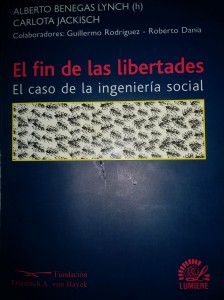EspañolThe prolific British historian Paul Johnson called the 20th century the “age of social engineering.” In his book Modern Times, he recounts the disastrous outcomes of large-scale experiments in Nazi Germany, Soviet Russia, and communist China.
They all had one thing in common: the ambitious rebuilding of society according to a grand design concocted inside some arrogant philosopher’s head. Like hammers driving rebellious nails flat, their leaders set out to carry out the plans as social engineers, forcing millions of lives to conform to supposed laws of history or the ideal New Man.

These are undoubtedly horrific episodes in our history, but today, they may seem distant and even unlikely. However, the underlying rationale of control is still very much a part of our modern states.
The End of Liberties: The Case of Social Engineering is a book that illuminates the shadowy work social engineers currently undertake. It’s scope is impressive: the book spans the origins of social engineering through the history of ideas, describes the most common practices, and refutes them systematically.
It succeeds, in part, due to the work of Argentinean economist Alberto Benegas Lynch, an interdisciplinary intellectual the likes of which only a few remain. Along with Carlota Jackish, Guillermo Rodríguez, and Roberto Dania, he demonstrates that behind protectionist economic policies, the expansion of state education, and environmentalism lurks the same desire to control human lives.
Philosopher King
The first secular formulations of the idea that society should be governed by an enlightened leader who carries out a collective goal overriding any personal considerations are from ancient Greece. Plato, according to Karl Popper in The Open Society and Its Enemies, is the forefather of totalitarian thought.
In his classic treatise on politics, The Republic, Plato argues that philosophers — those who are able to look past the material world and contemplate the abstract concepts of good, beauty, and justice — are best suited to tell the rest of society what to do.
His ideal society is a three-caste system: artisans, warriors, and rulers. Personal aspirations are irrelevant to the role one must fulfill in the social machinery.
[adrotate group=”8″]
Even though he never saw his model put into practice, Plato had a profound effect on Western thought, especially the social sciences that broke off from philosophy: psychology, law, sociology, economics, political science, and so on.
After the scientific revolution, 18th- and 19th-century thinkers blindly applied the method that worked so well with the natural sciences to try to solve social ills. Thus we get theorists like Henri de Saint-Simon, Auguste Comte, and Karl Marx, who believed they could “remake the whole universe guided by their reason alone,” as Johnson wrote in his book Intellectuals.
Comte, the father of sociology, “thought the scientific organization of society would end up assigning each person his adequate place according to his own abilities. That role would surely be decided by the wise men, and in that way social justice would be achieved.” Plato returns, disguised as scientific discourse.
Fatal Errors
Benegas Lynch highlights two principal errors that render the endeavors of social engineers impossible and illegitimate. First is the problem of knowledge: the idea that one person, or even a group of bureaucrats, can gather the necessary information to micromanage the lives of millions.
They ignore what the liberal tradition of spontaneous order (David Hume, Adam Smith, Friedrich Hayek) has always pointed out: social coordination is not the result of any one mind, central planner, or ultimate goal, but — just like language — emerges from people dealing with each other in pursuit of their own objectives.
The information that creates social harmony is constantly changing. It is distributed throughout the population, turning any static and short-sighted plan into a recipe for disaster.
Second, there is the false moral high ground of those who believe they are entitled to decide what happiness means for others. By stripping people of control of their own lives, “for their own good,” they’re not doing them a favor; they are belittling human beings who are just as worthy of respect.
An individual who does not work in pursuit of his own happiness has no incentive to move forward in life, and there will always be rebels whose desire to be free compels them to challenge tyranny.
Communism, the worst instance of social engineering, is mostly a thing of the past, but remains alive in places like Cuba, North Korea, and Venezuela. Yet even in so-called democratic countries, social engineers persist.
The days of grandiloquent leaders and rallying crowds may be fading, but the task now belongs to little-known technocrats, who work behind the scenes to tweak public policy to achieve certain ends.
It’s the government minister, the fiscal-policy adviser, the education-curriculum expert, and the public-health planner who lead the charge.
Should the government encourage spending, saving, or investment? How many jobs do we need to create this year? Do our universities need to “produce” more engineers, economists, or historians? Should alcohol, pornography, and drugs be allowed? Abstinence or sexual education? Should the country have fewer smokers, fewer couch potatoes, and more athletes?
These are all issues in which social engineers are in charge of nudging citizens toward a certain ideal of society and the good life.
While social engineers may be educated in the best universities, and even rationally argue that they seek the common good, they still cannot escape the mistakes of their intellectual ancestors.
 Versión Español
Versión Español












